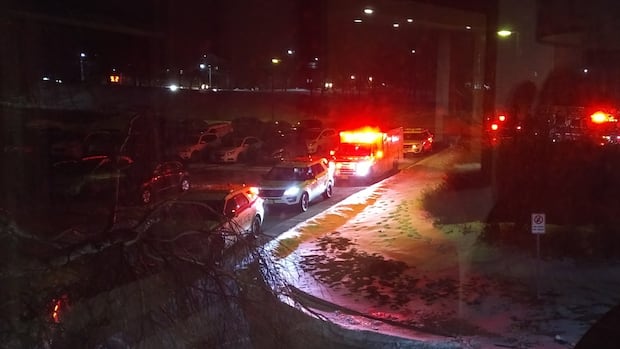The head of Nova Scotia’s police watchdog is raising significant concerns about the response of the province’s health-care system in the case of a 25-year-old Halifax man who was suffering from psychosis when he died during an arrest by police officers earlier this year.Erin Nauss, the director of the Serious Incident Response Team (SIRT,) suggested Friday a more comprehensive fatality inquiry might be “appropriate” to examine the circumstances surrounding the death of the man on the evening of Feb. 22 at the Halifax condo building where he lived.”There were some areas that were very concerning to me and my team as we worked through this file,” she said in an interview.Four calls in three daysIn a report issued Friday, SIRT cleared officers of criminal wrongdoing, concluding the force they used — which included a Taser — was reasonable in the circumstances as they struggled with the man. He had thrown items, was kicking and thrashing, and displaying “excessive strength,” according to the report.SIRT noted that it was the fourth time in three days that Halifax Regional Police had responded to calls about the man, who is not named in the report, and that on the morning of the day of his death officers had called paramedics and he agreed to go to hospital to be treated for psychosis.But at hospital, more than four hours passed before he was seen by a physician, who concluded it was a “situational crisis” requiring on-call psychiatric staff. Another five hours passed before a psychiatric nurse went to find the man in a hallway, but by that point he had left, according to the report.The nurse called one of the man’s family members, who said he had returned home, was “angry and agitated,” and that police had been contacted and were on their way to the condo, located in the community of Fairview, to bring him back to hospital.Officers called repeatedly, frantically, for paramedicsThe report also raises concerns about the response of EHS, Nova Scotia’s paramedic service. Police first radioed for EHS while heading to the scene, and then repeatedly during the arrest of the man under the Involuntary Psychiatric Treatment Act, but no paramedic arrived until 40 minutes after the initial call.The first radio call for EHS was at 7:41 p.m. AT and police were told they were “staging.” Officers took that to mean that a paramedic crew was near the scene and waiting for police to tell them it was safe to enter, according to the report.But according to the report, no paramedics were dispatched, despite officers repeatedly radioing for EHS. One of the officers struggling with the man said he wanted paramedics to sedate him so he could be taken to hospital, but the wait “felt like an eternity.”At one point, according to the report, the Halifax police watch commander on duty that night was yelling into the radio for EHS. Another officer finally tracked down an EHS supervisor at the Halifax rotary, about three kilometres away.The man under arrest started having trouble breathing, losing consciousness at 8:15 p.m., and officers began CPR, according to SIRT. The EHS supervisor arrived five minutes later, according to the report, and paramedics four minutes after. The man died at the scene.Mobile mental health team was too short-staffed to respondNauss said it’s unclear why EHS paramedics were not dispatched, as that is outside the scope of her team’s mandate, which is to assess whether criminal charges are warranted against a police officer involved in a serious incident.”But it’s clear that they were not, despite multiple calls being made by various police officers on the way to the call and throughout the interaction with this young man.”The report said the EHS supervisor told investigators that communication between EHS and police dispatch “can be problematic as they are not located together due to one being a provincial system and the other municipal.”Another question raised by the report is the mental health mobile crisis team, which includes social workers, nurses and specially trained officers that can be dispatched to help people in mental crises.The report said the victim’s family “took numerous steps in the period leading up to this tragic incident to seek help.” His mother told investigators she called the mobile crisis team the day before her son died, but was told they were short-staffed and could not see him for at least two days.The mother called 911 four times in three days. In the first three cases, she said her son was non-violent but she worried he was having a “mental break,” was hearing voices, thought someone was trying to kill him, or was talking about suicide. The fourth call came after he left hospital and returned home.Taser was not a factor in the deathThe medical examiner found the death was due to “complications of a physical altercation during an acute psychotic episode,” and determined there was no direct correlation with the use of the Taser, which was deployed once during the struggle.Nauss said it’s not her role to recommend a fatality inquiry, as that’s within the scope of the medical examiner and Nova Scotia’s justice minister, but she noted inquiries in the past have dealt with similar issues.”It’s difficult to say,” she said. “I feel like a situation like this is appropriate for a fatality inquiry.”While SIRT found the officers used reasonable force, police were criticized by the victim’s brother, who was at the scene. He said the officers made a “sarcastic and aggressive comment” about the situation as they arrived, according to the report.When he heard banging in the condo, he told SIRT he went in and saw his brother screaming and panicking, and said officers were “flailing him around the room” and assaulting him.Cabinet ministers decline to be interviewedCBC requested interviews Friday with Health Minister Michelle Thompson, Justice Minister Becky Druhan, Nova Scotia’s health authority and Emergency Medical Care Inc., which operates EHS.None agreed, but sent statements extending condolences to the family of the man who died.A health authority spokesperson said it has just received the report and “will carefully review its findings, ensuring we focus on identifying any areas where improvements can be made.”EHS said it co-operated with the SIRT investigation and did its own review.”We are committed to working with police services across Nova Scotia to improve communication and response processes when both agencies are involved,” the statement said.Thompson and Brian Comer, the provincial minister for addictions and mental health, said in a joint statement the report is being reviewed: “Investigations like these are essential to ensure our emergency response meets the needs of Nova Scotians in crisis.”Druhan said in a statement that SIRT reports “provide important insights,” and that a number of government departments are connecting “to better understand how we can prevent tragedies like this in the future.”
N.S. police watchdog raises concerns about health-care system after man’s death











